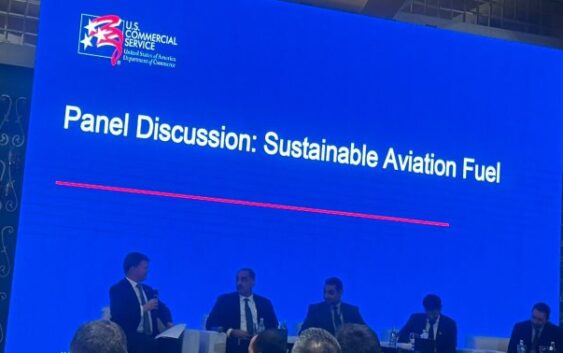- HOW VODACOM MOZAMBIQUE SAVED EMISSION OF 1,200 GREENHOUSE GAS
- APPIATSE TOWNSHIP PROJECT RECONSTRUCTION INAUGURATED IN GHANA
- EMZOR TO CONSTRUCT US$$23M API FACILITY IN NIGERIA
- TANZANIA PRESIDENT ANNOUNCED CONTRIBUTION OF TZS100MILLION FOR ARUSHA CHURCH CONSTRUCTION
- KITGUM-KIDEPO ROAD UPGRADE: UGANDA PARLIAMENT APPROVED SHs450BILLION LOAN
EGYPT SET TO BECOME FIRST SUSTAINABLE AVIATION FUEL PRODUCER

If Egypt becomes a Sustainable Aviation Fuel (SAF) producer, it can tap into a hungry and eager market, potentially becoming an export earner, Minister Counsellor of Commercial Affairs Keith Kirkham highlighted the attractiveness of being a first mover in a market where demand exceeds supply.
“Those who are first movers… will find themselves facing a very willing market, a very exciting market,” Kirkham stated. Moreover, SAF production in Egypt will contribute to environmental benefits such as reduced CO2 emissions and less pollution.
This came on the sidelines of a roundtable discussion hosted by the U.S. Embassy, between the Government of Egypt and American companies leading the development of Sustainable Aviation Fuel (SAF), wi discuss with industry and government the factors driving demand for Sustainable Aviation Fuel, the technology and supply chains required, and the role Egypt could play in its development.
Additionally, EgyptAir’s Director of Fuel and Emission, Ahmed Mattar, revealed the desire to have SAF production in Egypt, so EgyptAir can use SAF from Egypt and turn to a hub for Africa for the production of SAF.
In alignment with Egypt’s vision for 2030 and its commitment to climate change, Mattar, states, “We are committed to the sustainable aviation fuel by 2025 as a minimum of 2% of flights going to Europe and coming back from Europe mainly.”
He added that the SAF usage will contribute to “less pollution and the reduction of CO2 emissions.” Egypt’s vision for 2030 and its participation in COP27 and COP28 further emphasize the importance of sustainable aviation practices.
The SAF reduces CO2 emissions by as much as 80 percent over the fuel’s life cycle with the potential to reach 100 percent in the future. It is widely recognized as offering the greatest potential to decarbonize aviation over the next 20 to 30 years, according to the embassy.
As for the driving factors for SAF demand, the demand for SAF arises from a collective desire to address sustainability concerns in aviation. Minister Counsellor Keith Kirkham highlights the relevance of EU regulations and the increasing standards set by European destinations for Egyptian airlines. He notes that “destination[s] which many Egyptian airlines fly [to], they’re increasing standards to increase the proportion of aviation fuel that is sustainable.”
Companies are already producing SAF from various waste products. Keith Kirkham emphasized the potential of turning waste into valuable resources, stating that “American companies and their other companies as well… are producing sustainable aviation fuel from waste products, such as bio waste or even municipal garbage.”
Kirkham elaborated that Egypt has a well-developed and continuing to improve logistics and infrastructure base, believing that it could be a very viable and reasonably competitive location for the development of the SAF industry. “ However, we are still at the beginning steps.”
Determining the necessary policies and incentives requires collaboration between the private sector and the government. Keith Kirkham emphasizes that the private industry should identify the policies and incentives that would encourage their engagement. The government’s role lies in creating an enabling environment with supportive regulatory frameworks and incentives that attract private investment and foster sustainable growth in the SAF sector.
For his part, the Regional Head of Global Sustainability Policy and Partnerships at Boeing International, Mohamed Al-Ghailani, highlighted the opportunities in Egypt, stating, “There’s a lot of opportunities that can be capitalized on here, as there has been tremendous growth and sustainability.”
The potential to produce renewable energy through nitrogen, which is offered over sustainable aviation fuels is a key part of this equation, he noted.
“Our relationship with the Egyptian Government and with EgyptAir started in the 60s. We’ve been working with Egypt on aviation for a very long time. We were there at the COP27 in Sharm El-Sheikh to work on aviation decarbonization, And we also had the longest sustainable aviation fuel flight from Seattle to Cairo back in 2019. So we continue to collaborate on this topic and we look forward to further collaboration,” Ghailani told ET about collaborations with Egypt.
As for the challenges facing this industry, Matter said that they are focused on production, Technology, and cost.
Regional General Manager of the MEA Region, at GE Aerospace, Main Canaan, agreed with Matter, when it comes to the cost, warning the passengers bearing the cost, adding to ET that there are challenges of quantities, price, ease of transportation, and manufacturing all of these things.
SOURCE: EgyptToday

